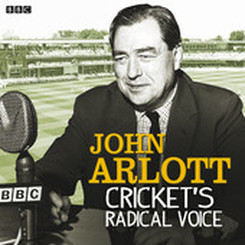 It is said that, faced by an immigration officer in apartheid-bound South Africa, the great(est) English cricket commentator John Arlott heard the question asking 'race' and simply replied 'human'. I have a similar reaction to my Prime Minister's encouragement to belong to 'Team Australia'. In the face of the breadth and complexities of international politics, violence and the abuse of religion, the only 'team' I would really want to belong to is 'Team Humanity'. Yet, like John Arlott, I wonder whether such mixing of politics with sport is actually good at all. It both diminishes the seriousness of the one and destroys what is life-giving in the other. This is not to say that the politics of sport is not a serious and important matter. John Arlott, a lifelong Liberal in the very best British sense, was himself a major opponent of apartheid within cricket, not least in his efforts to support the young, Cape Coloured, Basil D'Oliveira and to combat D'Oliveira's dismissive treatment by the cricket establishment at home and abroad. For power corrupts in sport, as it does anywhere else. FIFA is just one of today's preeminent modern examples. Sport is ultimately however only entertainment. It is not war or violence, even though it may often be a relatively peaceful way of handling those impulses. Tony Abbott is quite right that we need to work together to address violence and exclusion. Yet over-use of sporting metaphors is not entirely healthy, especially when it risks dividing those of different faith, race or national background into separate camps and also obscures our failures to meet our international obligations to refugees.
0 Comments
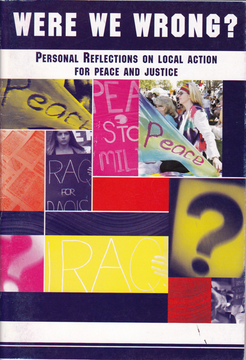 'Lest we forget' is a powerful phrase in the Australian lexicon, particularly in relation to military service. Such memories can be selective however, not least in the understanding and use of rightly remembered tragic military events. As we reflect upon events in northern Iraq for example, and ponder what practical assistance may be given to those who suffer from appalling violence, there seems to be some continuing amnesia about the history of outside involvement, including the US-led invasion of Iraq in 2003. Those of us who are Australians, for example, may rightly not easily understand all the dynamics which have led to the current carnage, yet we might reflect upon our own nation's shaping of some of the forces within it. Saddam Hussein was a terrible tyrant and the Coalition which toppled him understandably felt satisfaction in the liberation of his people from him. Yet it was a campaign of great violence which also destabilised Iraq and left deep scars and divisions. For whilst US-led power could win the war, it had few ideas, let alone a coherent plan, about how to win the peace. Coupled with diplomatic mistakes, the use of torture to extract information, and the cultivation of certain groups over others, this inability to win 'hearts and minds' has been a significant factor in the - let us remember - persistent communal violence in Iraq since 2003, which has now erupted into full-scale war. It gives those of us who vigorously opposed the 2003 Iraq War no satisfaction at all in saying this. Alongside addressing the immediate challenges of Islamist violence, we might however together express some national penitence for our own complicity in today's crisis and pray hard for greater wisdom than we as a nation, led by others, previously exercised. When you have dug yourself into a big hole, it is hard to get out, especially if you keep digging and don't reflect on what you have done. 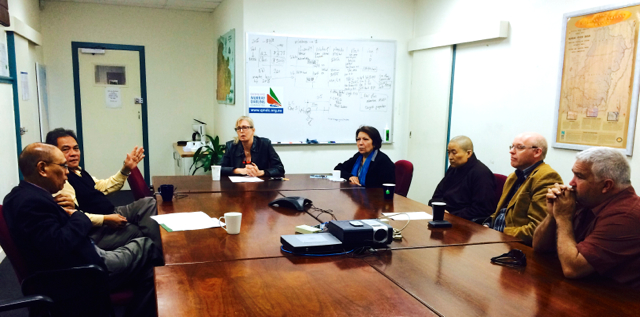 John Donne's view that 'no one is an island' becomes ever more real in our increasingly interconnected world. Recent violence across the globe has certainly impacted on Australians in a variety of ways, including directly in Toowoomba with the tragic loss of two deeply loved and respected doctors in the destruction of the MH17 flight. Others are directly or indirectly affected by war and violence elsewhere. This can easily raise tensions and prejudices. In addition to a number of community laments and intercessions (such as our ecumenical and interfaith service after the MH17 tragedy and the Day of Prayer for Iraq), local Toowoomba leaders are therefore renewing our efforts to work together for peace and harmony. For peace is not something we can take for granted but always has to be renewed by active relationships and purposeful prayer and action. In this we remain blessed in Toowoomba by our 'Model City' peace and harmony network. It was thus good this week to meet with other members of our Goodwill Committee to talk about how we can make a common stand against violence (see conversation photo above), reaffirming the commitment of all our varied faith and community groups to nurture a more inclusive and humane future. ABC journalist Belinda Sanders was then able to interview us for local radio, helping the positive values of our faiths and communities to balance out the violent excesses which are often over-exaggerated by less responsible media and which then feed negative responses based too much on fear and insecurity. 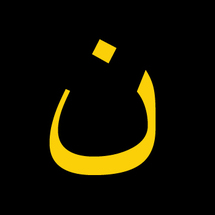 “If one part suffers, every part suffers with it." (1 Corinthians 12.26) - this is part of the reality of our contemporary lives in the one world we now inhabit. It is very difficult not to be affected by the sufferings of other parts of the world, particularly if we share in Christian relationship. The situation in Iraq is a particularly grave one. As the Archbishop of Canterbury observed recently: what is happening right now in northern Iraq is off the scale of human horror… we cry to God for peace and justice and security throughout the world, and especially for Christians and other minority groups suffering so deeply in northern Iraq. It is therefore a sad but important duty to share in prayer and solidarity with those who suffer. As we do so, so much of scripture also comes alive in a powerful manner and we are drawn back to the cross and mercy-power of God. 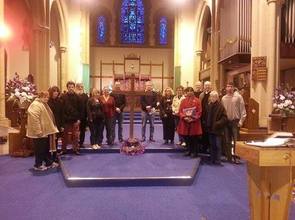 Yesterday, in St Luke's Church, we shared a particularly poignant Prayer together with other Christians. The initiative was from a young Christian, Courtney Heyward, from another (independent Evangelical) church, who has been touched to the heart by the situation in Iraq. It was a reflective occasion, with readings from scripture interspersed with times for silent or shared prayer. Stones, or 'prayer rocks', were given to everyone present to hold as we prayed, reminding us of the hard things endured by others (including the burying of loved ones by the side of the roads of flight) and of the rock of God's love at the heart of all things. Towards the end of the gathering, each of us laid our stone at the foot of the cross and lit a candle of hope. We also shared some ways in which we may offer practical support to the persecuted, including giving to appeal funds and advocating for the needs of refugees. May God's mercy and strength comfort, turn the hearts of those who inflict terror, grant wisdom to those in leadership, and renew all who suffer. 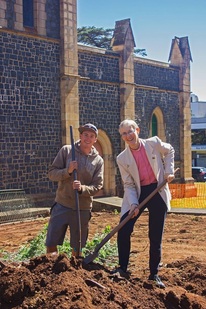 Great to see - and hear - work beginning on the first stage of our labyrinth on the St Luke's Toowoomba site today. The project will place a petite Chartres design labyrinth in the grounds of the church building, beneath the wonderful east end window (a copy of the oldest window - the 'Blue Virgin' - in Chartres Cathedral, one of the great European medieval cathedrals associated with Christian labyrinths). We hope that this will further develop the 'sacred tourism' and 'spiritual garden' potential of the St Luke's site (the 'Chartres of the South'?), offering a valuable extra tool for contemplative prayer, experiential spirituality, healing and reconciliation. My wife and colleague, the Revd. Penny Jones (seen left pretending to actually dig out the foundations) is a fully trained and accredited labyrinth facilitator with the Veriditas international labyrinth movement. She has already run workshops in Toowoomba, as well as elsewhere, and we look forward to this being a beautiful addition to life in Toowoomba. More information about our project can be found on the Toowoomba City Labyrinth site. 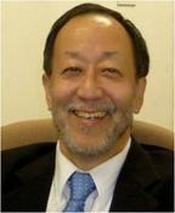 Delightful to meet Dr Joseph Osawa tonight, with us in Toowoomba this week to lead conflict resolution workshops. A Japanese American, with degrees from Harvard and the University of Southern California, Dr Ozawa has been a psychologist since 1980, working at very high levels, including for the Singapore government as a Senior Consultant Psychologist and as former Senior Director of the Family and Juvenile Justice Centre of the Subordinate Courts. An Active Anglican preacher, he has also been a licensed lay pastor at Saint Andrew's Cathedral of Singapore. In late 2003, St Andrew's sent him and his wife out as 'tentmaking missionaries', counseling especially amongst the homeless and lonely. A consultant with World Vision International, he has a wealth of experience in pastoral & missionary care, cross cultural issues, domestic problems (violence, substance abuse, etc) , medical-psychological healthcare integration and mental disorders, and stress & trauma recovery (including in post-tsunami recovery). What another lovely gift he is our city! Here is a little taste of his wisdom for parents and schools: My suggestion to parents is focus more on the heart values, home values, and spiritual values for their children, rather than just the material, external kind of things. "If you have a good home and a bad school life, you still can survive.If you have a good school life and a bad home, you can still survive.But if you have a bad home and a bad school, then you're in trouble." 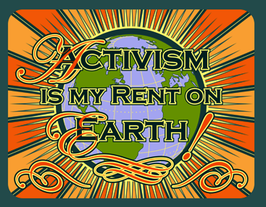 Like her or loath her, Melinda Tankard Reist has made an impact. Listening to her in Toowoomba yesterday, I was struck by the challenge and cost of the activism she lives and calls others into. I would not personally agree with exactly everything she says. Yet she remains one of the foremost contemporary 'pro-life feminist' voices and her grassroots campaigning movement Collective Shout is a lively force against the objectification of women and the sexualisation of girls in media, advertising and popular culture. Melinda is also a powerful encourager and embodiment of activism. Indeed, as the Glennie School and others locally have found this week, she is a particular inspiration to girls and women to stand up for themselves and for the needs of others. Does Melinda sometimes overestimate the negative effects of pornography and over-emphasise prohibition and protection rather than choice and liberation? Perhaps. Does her socially conservative background cause liberal concern? Maybe. How far does she contribute to the deep and thorny challenges of working through shame and honour, economic, cultural and gendered power, and the place of eros, sexual identity and expression in our contemporary world? Feminists seem divided on whether they agree with her or not, and how she contributes to their cause. Yet, whatever her own failings - and all activists have them - all would surely agree that she is an impressive agent provocateur for activism... |
AuthorJo Inkpin is an Anglican priest serving as Minister of Pitt St Uniting Church in Sydney, a trans woman, theologian & justice activist. These are some of my reflections on life, spirit, and the search for peace, justice & sustainable creation. Archives
July 2024
Categories
All
|
 RSS Feed
RSS Feed